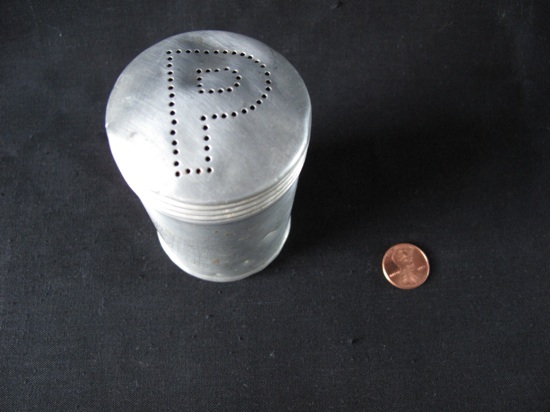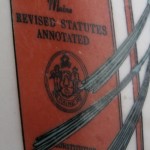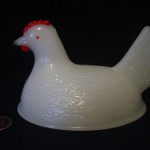[The auction for this Significant Object, with story by Philip Graham, has ended. Original price: 99 cents. Final price: $28.00. Significant Objects will donate the proceeds of this auction to 826 National.]
Lily hesitates before the open door of the empty pantry. Alone on one of the shelves sits a silvery white saltshaker, seemingly the only thing left behind by whoever once lived in this small house. Lily’s finger follows the puncture marks of the S that stretches across the top, and she imagines the tiny awl, the steady hand, the tap of the hammer.
She shakes it, but no grains rattle inside. When she begins to twist off the top, a faint metallic scrape of the threads stops her, as if the sound were some warning. She places the shaker back on its shelf.
After days of unpacking her boxes, everything finally rests in its new place except for Lily’s violin, which travels with her from room to room as she leans into the music, letting loose a waltz, a reel, a mad jig. But music doesn’t burn the past to ash so easily; instead, it seems to light the present on fire.
Weary from walking a sad music, Lily sits alone at the kitchen table, the pull of the strings still inside her, a sound so much like scratching that she’s afraid the walls, the wooden floors are marked with invisible scars. As Lily works her way through salad greens and a wedge of dark bread, she looks across the room at the pantry, at the saltshaker still alone on its shelf, so empty.
She knows that any emptiness — like the hollow of her violin — has hidden ways to speak. Maybe she should fill it. But why salt? Why not staples, or sequins? Shells, maybe. Better yet, sparks.
Or a sea, a tiny one.
Eyes closed, Lily imagines pushing off from the shore in a boat, to see if the rising waves might take her somewhere unexpected, the way music used to do. Soon she arrives at a deserted beach where a single tree stands, one long crooked branch pointing the way to a market in the distance.
The wooden stalls are busy with people trading things that mean nothing to her, and she’s about to leave when she sees a gray-haired woman guarding a table where a familiar object waits: a silvery white metal shaker with puncture wounds across the top, though these shape a P. Again, Lily imagines the tiny awl, the steady hand, a hammer’s tap.
She doesn’t have to touch the shaker to know that it’s empty too, and that she could fill it with anything: pins, pegs, dried petals. A plea. Patience.
Only when Lily holds this lost companion as her own does she breathe out carefully, thinking that all she needs to do now is retrace her path to the beach, the boat, and then she will find her way back to her new home.







There’s nothing like the completion of two powerfully associated opposites. Salt and pepper, they complete each other. There’s a contract there, a real promise of bonding, extending a space, making a liveable world, finding something effulgent from an emptiness (or set of null sets?). In this magical tale of opposites in search of completion, Lily’s imbalances and scars just may find a house-warming gift in the dreaming discovery of the Pepper shaker for her already discovered lonely shaker of Salt. Anyone seeking renewed creative balance, a sense of home and bonding, might do well to bid generously on this more than penny-wise Pepper pot as a truly cautionary tale with promises of spicey payoffs. All bids in, Philip Graham is saying, fair warning for this priceless gift of a healing unity of opposites.
You win: Best Comment of the Week.
Pingback: 5 Author Updates (7) | Significant Objects